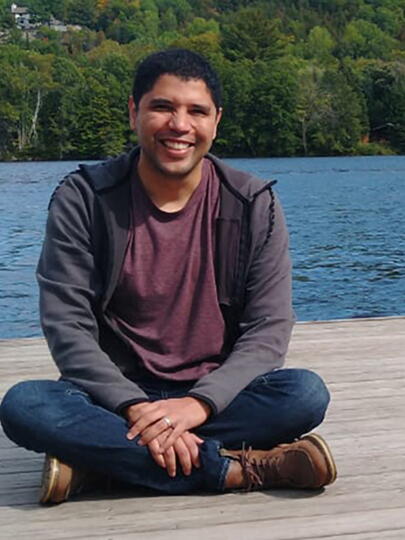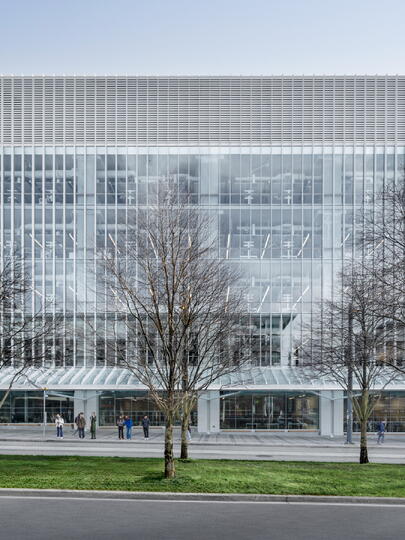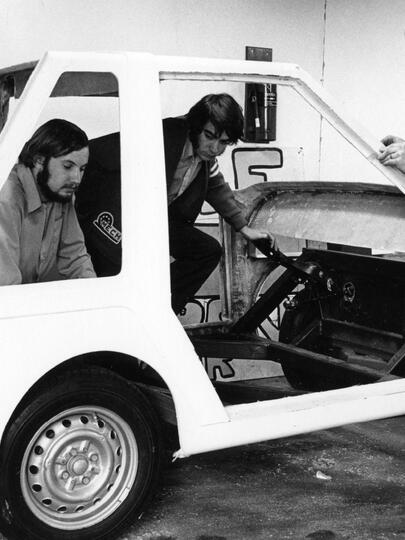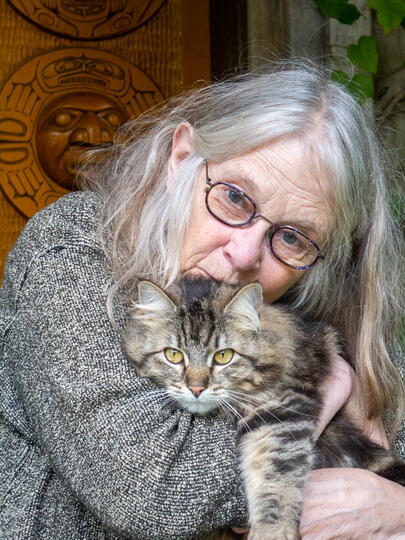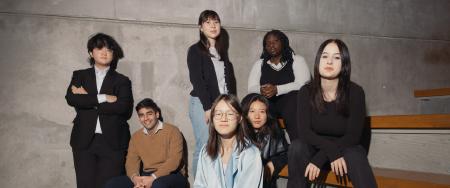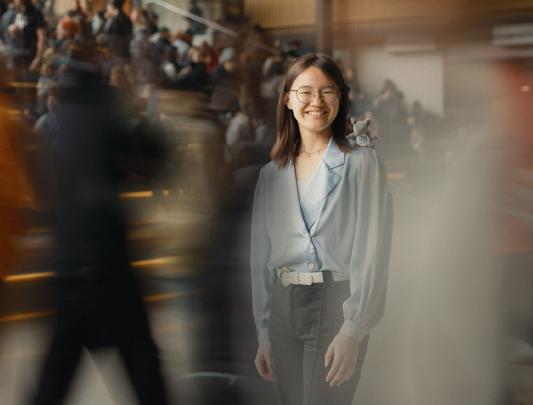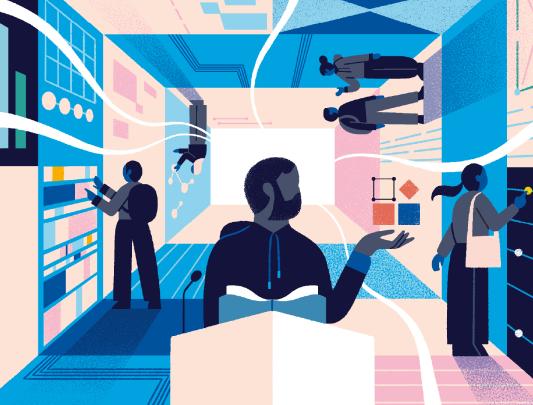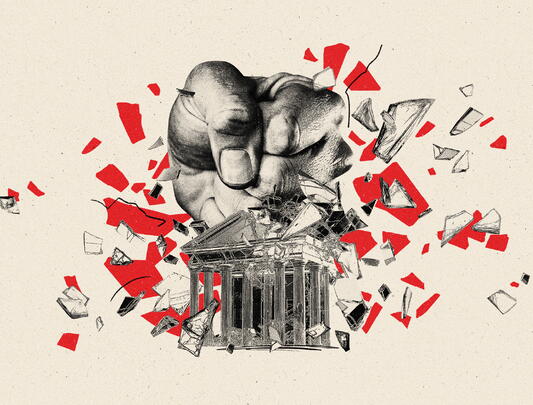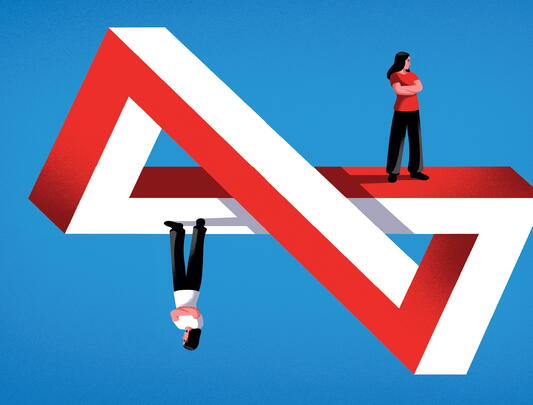
AMS president Esmé Decker in the students building, affectionately known as the Nest. Photo by Geoff Lister
The Gen Z effect
Advances in technology, a global pandemic, and the steep cost of living are shaping Gen Z’s experience of university – and they, in turn, are leaving their mark on campus.
From a fire hydrant to a keg of beer, UBC has a rich history of joke candidates running for student president. Esmé Decker carried on this tradition in the 2022 elections by running as “Remy the Rat,” inspired by an infamous viral video of a rat in a campus eatery. To Decker’s surprise, Remy placed second, so in this year’s elections she ran as a serious candidate on a dual platform of climate action and food security. Remy remained as her running mate, and they adopted the campaign slogan: “Serving Rat-ical Ideas!” Decker won the presidency after a record voter turnout. (The eatery, it should be said, has since been given a clean bill of health by authorities.)
Decker isn’t surprised her Gen Z classmates responded to the rodent-themed campaign. It hadn’t been long since their return from a long and lonely period of virtual learning. Remy/Decker offered everything her generation craved: creativity, fun, individualism, and, most of all, a passion for issues that were bigger than the campus itself.
“I was a joke candidate, but I ended up putting together an actually serious campaign,” says Decker, who was supported by the student activist group Climate Justice UBC. “We were just trying to bring in big imaginings of what the Student Union could look like if it really pushed for some big, social justice-centered ideas.”
University campuses have always been hotbeds of activism and progressive ideas. But Decker and her fellow Gen Z students – those born sometime in the late 90s or 00s who use words like “rizz” (short for charisma) and “sus” (short for suspicious) – are unlike the Millennials and Gen Xers that came before them. They are more connected and globally-minded. They have more avenues of communication and self-expression. They have their own notions of issues like mental health, gender equality, and institutional racism. They spent some of their formative years in an unprecedented global crisis. And now that they’re back on campus, they are reinventing the concept of university life.
Ainsley Carry has been working with students in American and Canadian universities for 25 years, most recently as vice-president, Students. He says the difference between Gen Zers and students of previous generations is in what Gen Zers feel their university owes them.
“When I went to university, when my parents went to university, we had fewer expectations on what the university should provide,” Carry explains. He says when he was in school, universities were responsible for dispensing education, and how students survived while gaining that education was, by and large, their own responsibility. But for many of the students he works with today, things like housing, food, transportation, healthcare, and even childcare are not seen as privileges, but rights.
“We have a lot more students who arrive now with this idea of, ‘I am paying tuition. I am a consumer. Therefore, the university must provide these things.’” But, continues Carry: “I don’t know if that’s a Gen Z trait, or if that’s just the new economy.”
After all, the old archetype of putting yourself through school by living frugally and working a part-time job is a bit out of date. Most university students have jobs on the side, but in a 2022 survey on the wellbeing of Canadian students conducted by Angus Reid, nearly half of the respondents reported feeling significantly stressed by education costs. This is compounded by rising housing costs – Vancouver being a prime example. Total student debt in Canada rose to $22.3 billion as of 2020, according to the Canadian Federation of Students, with the average undergraduate borrower owing $28,000.
If students are going to invest a small fortune in their education, they want more in return.
Carry also notices clear differences in the Gen Z worldview. They display a heightened interest in social justice, for example, having spent their teenage years amid movements like Black Lives Matter and #MeToo. They also place a greater emphasis on mental health and personal well-being. Finally, Gen Z students are more cognizant of their personal background and how it affects their education.
In light of this, Carry and his colleagues think about “new theories of student development,” which places greater emphasis on “pre-enrollment experiences” and “pre-enrollment trauma” – meaning the significant conditions or events that students carry with them onto campus. These range from watching one’s parents go through a difficult divorce, to experiencing racism, to fleeing your home country as a refugee.
“New theories of student development means thinking comprehensively about helping students adjust mentally, about healthcare needs and wellbeing. Student health is much more amplified today than it was in the 70s, 80s, and 90s.”
COVID-19, with its accompanying lockdowns, was a major event affecting both the mental health and educational experience of today’s students.
Dr. Neil Armitage, a UBC sociologist specializing in social change who lectures roughly 800 undergraduates a year, sees a clear line between pre- and post-pandemic Gen Z students. Gen Zers who were in college during and after the pandemic have a somewhat different view of the world – a world of Zoom meetings and virtual classrooms.
“Anecdotally, when I talk to my colleagues, we realize that there’s been a negative impact of COVID. Two, three years online, a lot got missed,” he says. During the pandemic, classrooms became bedrooms and kitchen tables. Students knew their classmates as floating heads in Brady Bunch-style box grids (to use a cross-generational reference). At any moment, students could play games, scroll social media in another window, or simply turn off their cameras and wander off. It’s no wonder, Armitage argues, that they struggled to stay connected. Although in-person classes have resumed, the struggle continues.
“This is the first time in my career that if I’m going to do group activities with my students, I actually have to set up rules and protocols for how to do them – because they’re so unfamiliar and uncomfortable, sometimes, with just starting a conversation or making those connections. That’s slightly alarming,” Armitage says.
Armitage, a former learning strategist at the Centre for Student Involvement and Careers, says the rise of high-tech learning may have permanently changed how Gen Zers think of education in general. Students can attend a lecture from a treadmill at the gym or from a beach in Cancun. They can conjure up tailored selections of journal articles for any topic in seconds and then use ChatGPT to write detailed research summaries.
“They’re very much a quick access, on-demand generation. There is this idea of, ‘If you just allow me to access the information, then I will learn it,’” Armitage continues. “Whereas, there is also a social model of learning where you learn from your peers in a shared space.”
Esmé Decker agrees that her first year in a pandemic-era, virtual UBC was an isolating experience. But she arrived on campus ready to make up for lost time. In fact, part of why she ran her gag candidacy for Student Union president was to get people more interested in campus society. She immediately threw herself into clubs and organizations, including Climate Justice UBC and UBC Climate Hub.
As an English major, she describes herself as a “climate storyteller.” To her, climate change is the defining Gen Z issue. “We’re growing up in a world where we’re not only worried about climate change but also seeing the effects of it. Around the world, all the time.”
Likewise, no generation has been as equipped to rally around such a massive, global issue, Decker argues. After all, student pressure played a large part in prompting UBC’s 2020 commitment to fully divest its assets from fossil fuels by 2030.
“I would think that Gen Z has an especially global mindset just because of the access to information and connectivity. The world is more connected, but because it’s so big, it makes you feel small, right? You’re connected to so much, taking in so much information all the time. To grow up like that, there’s just more awareness of what’s going on. Each person is dealing with their own struggles, but we’re more connected to this global struggle as well.”
“We’re growing up in a world where we’re not only worried about climate change but also seeing the effects of it. Around the world, all the time.”
Working with the new wave of undergraduate students, Ainsley Carry has also observed a stronger connection between Gen Z students and the world outside their campus – as well as an eagerness to get out in it. Students are working on their careers the moment they step on campus, taking on internships as early as their first or second years.
Neil Armitage has observed the same eagerness to get out into the world, but it gives him pause. It may mean that students are more likely to view university as a stepping stone rather than a rewarding experience in and of itself. For many students, what has traditionally been a journey of self-reflection and self-discovery has become a series of boxes to check on the way to their next stage in life.
He thinks this reflects a consumer model of education and a preoccupation with getting a return on their investment. “Students can be like cost/benefit analysts,” he says, adding that this is likely driven by uncertainty about the future.
“They want to play it safe and stay ‘on the right track.’ They want everything itemized, listed, and easy – to be given steps from one thing to the next thing, to the next thing.” He calls this phenomenon “education by Lego.”
That said, Armitage says Gen Z has been challenging universities to change for the better, shaking faculty “out of our ruts” and redefining the concept of higher education.
“In Arts especially, students sometimes get tired of us talking pessimistically, and not having any theories of change or action. As academics, we’re very good at explaining the issues but not always good at addressing them. We can delve more deeply into issues than students do in their everyday lives, but they’re not just looking for understanding – they’re also looking for change.”
He believes their passion for activism and positive change will also help them discover and fight for solutions to rising education costs.
“I’m glad that there is an activist voice there,” he says. “There’s a more political force within Gen Z.”
If any student embodies this passion, it is Esmé Decker, who is keen to lead change on campus. She is also eager to get out into the professional world, but only once she has finished a teaching program. Motivated partly by British Columbia’s teacher shortage, she plans to spend her career in a classroom as a secondary-level English and language teacher. “I want to support more students along the path to wherever they want to go in life. And I think engaging with storytelling and communication is just such an important part of that.”
Decker’s time at UBC has not been merely a stepping stone or a box to tick. Rather, her involvement in campus life, including her unexpected vault into student politics, has helped shape her goals and passions. She hopes to implant in future generations the same sense of responsibility, creativity, and passion she shares with her classmates – though not necessarily as Remy the Rat.








